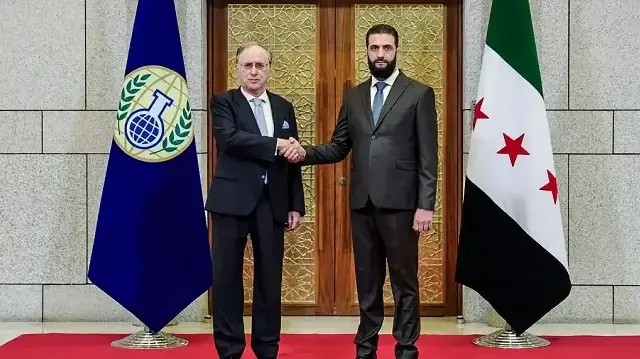Syria reactivates mission to chemical weapons watchdog in The Hague

Syria has reinstated its permanent diplomatic mission to the Organization for the Prohibition of Chemical Weapons in The Hague, appointing Mohammed Katoub as its ambassador. The move follows Foreign Minister Asaad Al-Shaibani's first participation in an OPCW Executive Council meeting earlier this month, signaling renewed engagement with the chemical weapons monitoring body.
Syria has reestablished its permanent diplomatic representation to the Organization for the Prohibition of Chemical Weapons, restoring its mission to the international chemical weapons watchdog based in The Hague. The Syrian Foreign Ministry has appointed Mohammed Katoub as the country's ambassador to the OPCW, according to reports from the state-run SANA news agency, marking a significant step in Damascus's renewed engagement with the organization.
Recent Diplomatic Engagement
The decision to reactivate Syria's OPCW mission follows Foreign Minister Asaad Al-Shaibani's inaugural participation in a meeting of the OPCW Executive Council on March 5. This diplomatic development comes after the UN General Assembly's First Committee recently passed a resolution acknowledging what it described as a phase of "positive and advanced cooperation" between Syria and the chemical weapons monitoring organization, indicating growing international support for Syria's reintegration.
Historical Context of Chemical Weapons Use
According to documentation from the Syrian Network for Human Rights, forces loyal to former President Bashar al-Assad conducted 217 chemical attacks following the outbreak of Syria's conflict in 2011. The most devastating incident occurred in Eastern Ghouta and Muadhamiyat al-Sham in August 2013, resulting in over 1,400 civilian fatalities, including hundreds of women and children, with more than 10,000 additional casualties. Syria subsequently joined the OPCW in September 2013 under international pressure.
Past OPCW Actions and Suspension
Following Syria's accession to the chemical weapons convention, a joint UN-OPCW mission oversaw the destruction of declared chemical weapons stockpiles by August 2014. However, subsequent investigations revealed that the Syrian regime had only declared partial stockpiles, with chemical attacks continuing using chlorine and sarin in various locations including Aleppo. These violations led OPCW member states to suspend certain Syrian membership rights in April 2021 after confirming chemical weapons use in Latamneh (2017) and Saraqib (2018).
Reklam yükleniyor...
Reklam yükleniyor...







Comments you share on our site are a valuable resource for other users. Please be respectful of different opinions and other users. Avoid using rude, aggressive, derogatory, or discriminatory language.